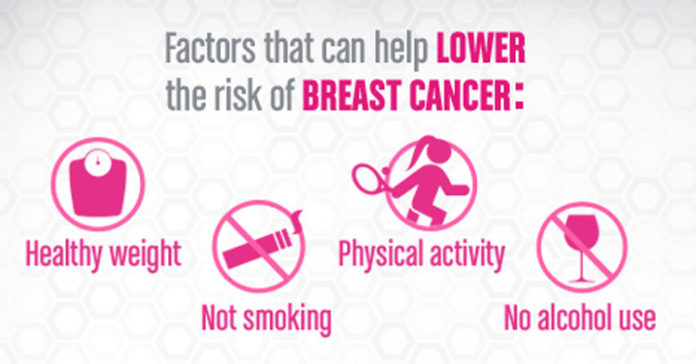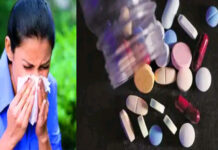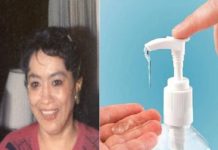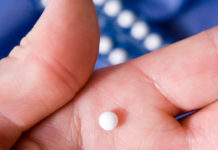Breast cancer is the most common cancer in the world – one in eight women develop the disease at some stage in their lifetime.
Breast cancer is rare in men. Only three per cent of breast cancer cases are in women who carry genes that have been linked to the disease. Many of the factors that increase your chances of developing the disease are linked to your lifestyle.
What is breast cancer?
Breasts are made up of fatty connective tissue, milk-producing glands and ducts that carry milk from the glands to the nipple. Breast tissue naturally develops in response to hormones at different stages of life – for example, during puberty, pregnancy and breastfeeding.
Breast cancers almost always develop in the glands or ducts that produce milk and carry it to the nipple.
Cancers develop as a result of cells being damaged, which then grow uncontrollably, forming a lump or thickening called a tumour.
There are many different reasons why breast cancers develop, and hormones (particularly oestrogen) can influence the development and growth of some breast cancers. This means that life events that affect your hormone levels, such as pregnancy, can alter your cancer risk.
There are also other important risk factors that you can do something about, such as your diet and lifestyle choices.
Who is most at risk of breast cancer?
As with all cancers, the risk of developing breast cancer depends on a number of factors and varies from person to person.
Lifestyle risk factors
- Drinking alcohol
- Being overweight or obese (for post-menopausal breast cancer only)
- Adult weight gain
- Not doing enough physical activity
- Not breastfeeding when you have a baby
Other risk factors
- Age – your risk increases as you get older
- Greater weight at birth (pre-menopausal breast cancer only)
- Height – taller women are at greast risk
- Starting your period early (before age 12)
- Going through menopause late (over age 55)
- Not having children, or having a first pregnancy over the age of 30
- Family history – particularly if a close relative was diagnosed before the age of 50. If you are concerned about this, we recommend you speak to your doctor
- Taking combined hormone replacement therapy (the evidence is less clear for oestrogen-only HRT) – risk slightly increases the longer you take HRT, but decreases gradually once you stop
- Taking the oral contraceptive pill (the evidence is less clear for the mini pill) – risk slightly increases when you take the pill, but slowly returns to normal after you stop
If any of these apply to you, it does not mean that you will develop breast cancer – it just means that your risk may be higher than average. The good news is that there are steps you can take to reduce your risk
How can you reduce your risk of breast cancer?
![]() Cut down on alcohol
Cut down on alcohol
There is strong evidence that drinking alcohol increases breast cancer risk. In fact, one in five breast cancers could be prevented if we didn’t drink alcohol. Find out more about the link between alcohol and cancer or find out how many calories are in alcoholic drinks by using our alcohol calorie calculator.
![]() Be a healthy weight
Be a healthy weight
The relationship between weight and breast cancer at different stages of life is complex and more research is needed.
Surprisingly, there is evidence that being overweight or obese in adulthood before the menopause can reduce the risk of pre-menopausal breast cancer.
However, being a healthy weight and avoiding weight gain throughout adulthood are important in decreasing your risk of breast cancer after the menopause, which is the most common type of breast cancer, accounting for about 80 per cent of cases. Around 1 in 6 cases could be prevented if everyone was a healthy weight.
Our recommendation is to maintain a healthy weight throughout all stages of life as being a healthy weight helps to prevent post-menopausal breast cancer and 10 other common cancers, as well as other conditions such as type 2 diabetes and heart disease.
![]() Be more active
Be more active
Vigorous physical activity lowers the risk of premenopausal breast cancer and every type of physical activity (moderate and vigorous) reduces the risk of postmenopausal breast cancer. We recommend being physically active for at least 30 minutes every day, and to sit less. The more active you are the better – try our exercise calorie calculator for more ideas.
![]() If you can, breastfeed your baby
If you can, breastfeed your baby
Breastfeeding is good for your baby’s health and it can also help protect you against breast cancer. Find out more about our breastfeeding for cancer prevention recommendation.
What about screening?
The good news is that most breast cancer cases can be successfully treated if they are detected early.



















































